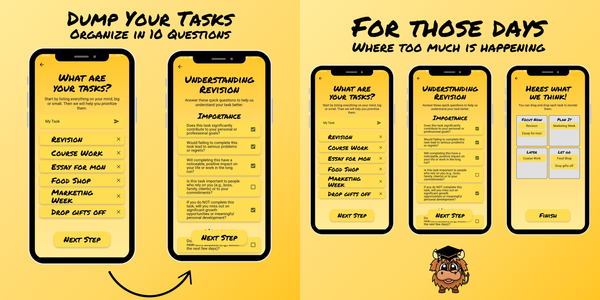Procrastination: The Good, The Bad, and How to Overcome It


Introduction
Procrastination is something everyone experiences. Whether it’s delaying a work project, postponing a workout, or putting off studying for an exam, we all struggle with procrastination at some point. While it is often viewed negatively, research suggests that procrastination isn’t always bad—it depends on how and why you delay tasks.
In this article, we’ll explore the causes of procrastination, its negative effects, potential benefits, and practical strategies to overcome it. Plus, we’ll introduce Mairy’s Prioritisation Tool, designed to help you manage tasks effectively using the Eisenhower Matrix.
What is Procrastination?
Procrastination is the act of delaying or postponing important tasks in favor of more enjoyable or easier activities. It is often mistaken for laziness, but in reality, procrastination is more about emotional regulation than poor time management.
Why Do We Procrastinate?
There are several psychological and emotional reasons why people procrastinate, including:
- Feeling Overwhelmed – When a task seems too big or complex, it’s easier to put it off.
- Perfectionism & Fear of Failure – Worrying that a task won’t be done perfectly can cause hesitation.
- Low Self-Esteem – Doubting your abilities can make starting a task feel impossible.
- Lack of Interest – Uninteresting tasks are often delayed in favor of more engaging activities.
- Distractions – Social media, notifications, and digital devices make it easier than ever to procrastinate.
- Mental Health Conditions – Conditions like ADHD, OCD, depression, and anxiety can contribute to chronic procrastination.
The Negative Effects of Procrastination
Procrastination can have serious consequences on both mental and physical health, academic performance, and professional success.
1. Increased Stress and Health Issues
Studies show that chronic procrastination is linked to higher stress levels, anxiety, depression, and physical health problems such as:
- Insomnia
- Digestive problems
- Muscle tension and headaches
2. Poor Academic Performance
For students, procrastination can lead to:
- Lower grades
- Missed deadlines
- Higher levels of stress before exams
3. Job Performance and Financial Impact
Procrastination at work can lead to:
- Missed opportunities and deadlines
- Lower job performance
- Higher risk of unemployment and lower income
4. Avoidance of Health Checkups
Many procrastinators delay doctor and dental visits, increasing their risk of undiagnosed health conditions.
The Hidden Benefits of Procrastination
Not all procrastination is bad. Active procrastination can be a strategic tool for productivity.
1. More Time for Planning
Delaying a task intentionally can provide extra time for brainstorming and problem-solving.
2. Task Prioritization
If you are an active procrastinator, you may use delay to finish smaller, urgent tasks first, making it easier to focus on larger projects later.
3. Increased Motivation
Some individuals work better under pressure. A looming deadline can boost focus and efficiency.
How to Stop Procrastinating
If procrastination is affecting your productivity, mental health, or academic performance, here are some actionable strategies to overcome it.
1. Break Tasks into Smaller Steps
Large tasks can feel overwhelming. Divide them into smaller, manageable parts to make them easier to start.
2. Use the Eisenhower Matrix (Mairy’s Prioritisation Tool)
Mairy is a daily mood diary that helps you track patterns in your life. Our prioritisation tool uses the Eisenhower Matrix to sort tasks into four categories:
- Urgent & Important – Do these immediately.
- Important but Not Urgent – Schedule these tasks.
- Urgent but Not Important – Delegate these tasks.
- Neither Urgent nor Important – Consider eliminating these tasks.
This system helps you focus on what truly matters, reducing procrastination.
3. Reduce Distractions
- Put your phone on silent or airplane mode.
- Use website blockers to limit social media usage.
- Work in a quiet, dedicated space.
4. Set Deadlines and Use a Timer
Try the Pomodoro Technique: Work for 25 minutes, then take a 5-minute break. Repeat this cycle to maintain focus.
5. Practice Self-Compassion
If you’ve procrastinated, don’t be too hard on yourself. Studies show that forgiving yourself for procrastination can help break the cycle.
FAQs About Procrastination
How does procrastination affect daily life?
Procrastination can lead to increased stress, missed deadlines, financial problems, and decreased productivity in daily life.
Why do students procrastinate?
Students often procrastinate due to academic pressure, fear of failure, distractions, and time mismanagement.
Can procrastination be linked to mental health issues?
Yes, chronic procrastination is associated with anxiety, depression, ADHD, and OCD.
FAQs About Mairy’s Prioritisation Tool
How does Mairy help with procrastination?
Mairy’s daily mood diary tracks patterns in your life, helping you identify procrastination triggers. Its prioritisation tool (Eisenhower Matrix) allows users to organize tasks effectively, reducing the urge to delay important work.
What makes Mairy different from other productivity apps?
Unlike generic productivity tools, Mairy customizes recommendations based on your mood and personal priorities, helping you take actionable steps to improve daily productivity.
Can Mairy be used for work and personal life?
Yes! Mairy is designed for students, professionals, and anyone looking to improve task management and mental well-being.
Conclusion
Procrastination is not just about poor time management—it’s about how we regulate emotions and prioritize tasks. While it can have negative effects on health, academics, and work, active procrastination can sometimes be beneficial when used strategically.
If you’re struggling with procrastination, tools like Mairy’s Prioritisation Feature can help you identify important tasks, manage time better, and reduce stress. Start taking control of your tasks today!
Ready to Beat Procrastination?
📲 Download Mairy now and start improving your productivity!






